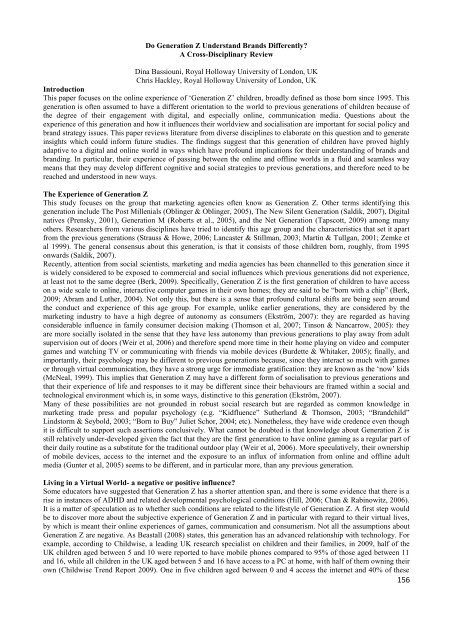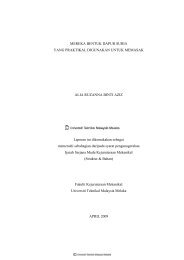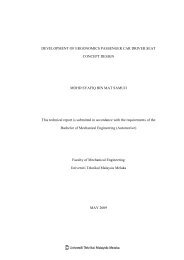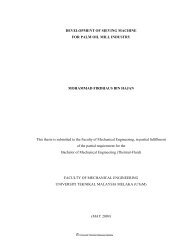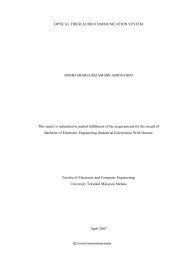Brand, Identity and Reputation: Exploring, Creating New Realities ...
Brand, Identity and Reputation: Exploring, Creating New Realities ...
Brand, Identity and Reputation: Exploring, Creating New Realities ...
Create successful ePaper yourself
Turn your PDF publications into a flip-book with our unique Google optimized e-Paper software.
Do Generation Z Underst<strong>and</strong> <strong>Br<strong>and</strong></strong>s Differently?<br />
A Cross-Disciplinary Review<br />
Dina Bassiouni, Royal Holloway University of London, UK<br />
Chris Hackley, Royal Holloway University of London, UK<br />
Introduction<br />
This paper focuses on the online experience of ‗Generation Z‘ children, broadly defined as those born since 1995. This<br />
generation is often assumed to have a different orientation to the world to previous generations of children because of<br />
the degree of their engagement with digital, <strong>and</strong> especially online, communication media. Questions about the<br />
experience of this generation <strong>and</strong> how it influences their worldview <strong>and</strong> socialisation are important for social policy <strong>and</strong><br />
br<strong>and</strong> strategy issues. This paper reviews literature from diverse disciplines to elaborate on this question <strong>and</strong> to generate<br />
insights which could inform future studies. The findings suggest that this generation of children have proved highly<br />
adaptive to a digital <strong>and</strong> online world in ways which have profound implications for their underst<strong>and</strong>ing of br<strong>and</strong>s <strong>and</strong><br />
br<strong>and</strong>ing. In particular, their experience of passing between the online <strong>and</strong> offline worlds in a fluid <strong>and</strong> seamless way<br />
means that they may develop different cognitive <strong>and</strong> social strategies to previous generations, <strong>and</strong> therefore need to be<br />
reached <strong>and</strong> understood in new ways.<br />
The Experience of Generation Z<br />
This study focuses on the group that marketing agencies often know as Generation Z. Other terms identifying this<br />
generation include The Post Millenials (Oblinger & Oblinger, 2005), The <strong>New</strong> Silent Generation (Saldik, 2007), Digital<br />
natives (Prensky, 2001), Generation M (Roberts et al., 2005), <strong>and</strong> the Net Generation (Tapscott, 2009) among many<br />
others. Researchers from various disciplines have tried to identify this age group <strong>and</strong> the characteristics that set it apart<br />
from the previous generations (Strauss & Howe, 2006; Lancaster & Stillman, 2003; Martin & Tullgan, 2001; Zemke et<br />
al 1999). The general consensus about this generation, is that it consists of those children born, roughly, from 1995<br />
onwards (Saldik, 2007).<br />
Recently, attention from social scientists, marketing <strong>and</strong> media agencies has been channelled to this generation since it<br />
is widely considered to be exposed to commercial <strong>and</strong> social influences which previous generations did not experience,<br />
at least not to the same degree (Berk, 2009). Specifically, Generation Z is the first generation of children to have access<br />
on a wide scale to online, interactive computer games in their own homes; they are said to be ―born with a chip‖ (Berk,<br />
2009; Abram <strong>and</strong> Luther, 2004). Not only this, but there is a sense that profound cultural shifts are being seen around<br />
the conduct <strong>and</strong> experience of this age group. For example, unlike earlier generations, they are considered by the<br />
marketing industry to have a high degree of autonomy as consumers (Ekström, 2007): they are regarded as having<br />
considerable influence in family consumer decision making (Thomson et al, 2007; Tinson & Nancarrow, 2005): they<br />
are more socially isolated in the sense that they have less autonomy than previous generations to play away from adult<br />
supervision out of doors (Weir et al, 2006) <strong>and</strong> therefore spend more time in their home playing on video <strong>and</strong> computer<br />
games <strong>and</strong> watching TV or communicating with friends via mobile devices (Burdette & Whitaker, 2005); finally, <strong>and</strong><br />
importantly, their psychology may be different to previous generations because, since they interact so much with games<br />
or through virtual communication, they have a strong urge for immediate gratification: they are known as the ‗now‘ kids<br />
(McNeal, 1999). This implies that Generation Z may have a different form of socialisation to previous generations <strong>and</strong><br />
that their experience of life <strong>and</strong> responses to it may be different since their behaviours are framed within a social <strong>and</strong><br />
technological environment which is, in some ways, distinctive to this generation (Ekström, 2007).<br />
Many of these possibilities are not grounded in robust social research but are regarded as common knowledge in<br />
marketing trade press <strong>and</strong> popular psychology (e.g. ―Kidfluence‖ Sutherl<strong>and</strong> & Thomson, 2003; ―<strong>Br<strong>and</strong></strong>child‖<br />
Lindstorm & Seybold, 2003; ―Born to Buy‖ Juliet Schor, 2004; etc). Nonetheless, they have wide credence even though<br />
it is difficult to support such assertions conclusively. What cannot be doubted is that knowledge about Generation Z is<br />
still relatively under-developed given the fact that they are the first generation to have online gaming as a regular part of<br />
their daily routine as a substitute for the traditional outdoor play (Weir et al, 2006). More speculatively, their ownership<br />
of mobile devices, access to the internet <strong>and</strong> the exposure to an influx of information from online <strong>and</strong> offline adult<br />
media (Gunter et al, 2005) seems to be different, <strong>and</strong> in particular more, than any previous generation.<br />
Living in a Virtual World- a negative or positive influence?<br />
Some educators have suggested that Generation Z has a shorter attention span, <strong>and</strong> there is some evidence that there is a<br />
rise in instances of ADHD <strong>and</strong> related developmental psychological conditions (Hill, 2006; Chan & Rabinowitz, 2006).<br />
It is a matter of speculation as to whether such conditions are related to the lifestyle of Generation Z. A first step would<br />
be to discover more about the subjective experience of Generation Z <strong>and</strong> in particular with regard to their virtual lives,<br />
by which is meant their online experiences of games, communication <strong>and</strong> consumerism. Not all the assumptions about<br />
Generation Z are negative. As Beastall (2008) states, this generation has an advanced relationship with technology. For<br />
example, according to Childwise, a leading UK research specialist on children <strong>and</strong> their families, in 2009, half of the<br />
UK children aged between 5 <strong>and</strong> 10 were reported to have mobile phones compared to 95% of those aged between 11<br />
<strong>and</strong> 16, while all children in the UK aged between 5 <strong>and</strong> 16 have access to a PC at home, with half of them owning their<br />
own (Childwise Trend Report 2009). One in five children aged between 0 <strong>and</strong> 4 access the internet <strong>and</strong> 40% of these<br />
156


